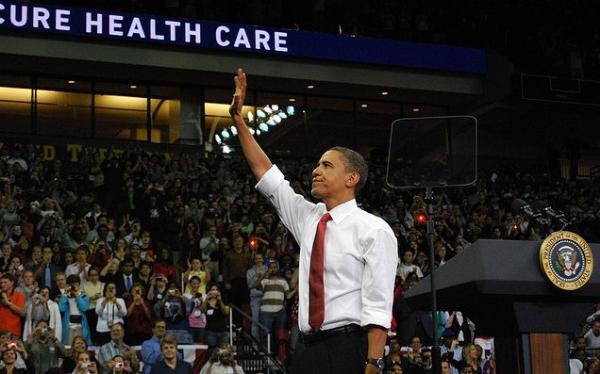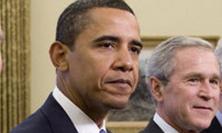One of the most hotly-debated issues of Barack Obama’s presidency has been his attempt to reform America’s health care system. The Affordable Care Act has now been signed into law, but not without significant challenges from Catholic organisations. Why has the Church chosen to enter this discussion? Vincent Rougeau explains why ‘Obamacare’ has been a source of contention and places the debate in the wider context of American politics at the moment.
Earlier this summer, the U.S. Supreme Court upheld most of President Obama’s signature piece of new legislation, the Affordable Care Act, which is designed to give all Americans access to health insurance. Just weeks before the decision, a group of Catholic organisations led by the University of Notre Dame filed a law suit against the U.S. Department of Health and Human Services (HHS), challenging rules written pursuant to the Act that require employers to provide insurance coverage for various contraceptive and sterilisation procedures. Although certain religious organisations are exempt from this mandate, many would not be, meaning that some religious groups would face paying directly or indirectly for insurance that covers procedures they find morally unacceptable.
This potential conflict has caused many to see the current position of the Obama administration as an attack on religious freedom. Indeed, the dispute does raise critical issues about religious practice that a culturally diverse democracy must work carefully to resolve. How do we define ‘religious freedom’ in the case of an employer who is legally mandated to provide a benefit for all citizens? When is an employer too large or too integrated into the mainstream employment market to claim a religious freedom exemption? More broadly, has the United States reached a cultural and political impasse about the role of religion in the nation’s public life that will require a re-negotiation of what religious freedom will mean in the decades ahead?
Although the HHS rule affects a broad cross-section of religious groups, it is not surprising that the Catholic Church and Catholic universities have taken the lead in mounting opposition to the rule. Many of America’s most prominent hospitals and universities are run by orders of Catholic priests and women religious, and the broad availability of health care and education in the United States has long been dependent on ministries of the Catholic Church. Consequently, many people who rely on Catholic institutions for services and employment are not themselves Catholic. How, then, should the law respond when a non-Catholic employee at a Catholic university seeks insurance coverage for a procedure that the Catholic Church rejects as immoral, but is covered as part of a health insurance entitlement due to all Americans?
One way out of this problem would have been for the federal government to be the default provider of health insurance for those without it. But this approach proved impossible in a country utterly riven by a fundamental debate about the role of the state. A political consensus that would allow the government to run a national health insurance system was simply out of the question. Instead, the Affordable Care Act uses private insurance to deal with the problem of citizens without adequate health care. Most Americans receive private health insurance through their employers, and, despite widespread agreement that this is not necessarily the best way to assure health care for the entire population, it was the only politically viable solution. This approach left those employers with religious objections to aspects of the government’s coverage mandates in the awkward position of paying for or funding insurance that covers procedures to which they object on moral grounds.
The most obvious solution to the concerns raised by those with religious objections lies in the language of an exemption for ‘religious employers’. The law suit suggests that an appropriate broadening of what constitutes a ‘religious employer’ would go a long way toward addressing the core concerns of many of the litigants. The current language of the HHS rule exempts those employers whose purpose is to inculcate religious values, as well as those who employ and serve primarily individuals who share the same religious tenets. This language may even exempt some of the current litigants, such as Catholic dioceses, but it would not cover hospitals, colleges and universities.
Too broad an exemption would wreak real havoc. Many could easily claim to be ‘religious employers’ and thereby substitute their personal views on what health insurance should cover for those that have been determined through the democratic political process. Historically, American courts have been sympathetic only to very narrow religious freedom exemptions to generally applicable laws. Given the diversity of the U.S. population, the religious beliefs of any one employer may only represent the views of a small minority.
The easiest case for an exemption occurs when those employees affected by the exemption are members of the group whose religious belief or practice is burdened by the law. One would assume these individuals wish to adhere to their faith commitments and, for religious reasons, are voluntarily surrendering a benefit or service they would otherwise be eligible to receive. But what if the employer’s minority view means that those employees who embrace the majority view are prevented access to a benefit or service that the law makes available to everyone? Under these circumstances, a broader exemption risks limiting coverage for those who are both entitled to broader insurance coverage and wish to have it.
Once again the awkward mechanism for providing universal health coverage in the United States demonstrates its limitations. Because individuals, corporations and charities (known as non-profit corporations in the U.S.) provide health insurance coverage rather than the state, objections rooted in the individual rights of those who pay for coverage must be addressed, but do those rights extend to corporate entities? Recent trends in American constitutional law suggest that the answer may well be yes, particularly subsequent to a 2008 Supreme Court decision (Citizens United v. Federal Election Commission), which upheld certain kinds of political spending by corporations as protected under the freedom of speech language of the First Amendment of the U.S. Constitution.
Experience in both the U.S. and in other parts of the world suggests that faith-based organisations have legitimate concerns about their religious values being undermined by government mandates that run counter to their religious beliefs. To avoid the problem altogether, some observers have argued that most of the services these organisations provide should be taken on by secular groups or by the state. Given that the United States relies so heavily on religious institutions to provide key social services, and for a number of practical, historical and cultural reasons, a change of this kind is neither likely nor particularly desirable. Even people politically sympathetic to President Obama, including members of his cabinet, were dismayed that the HHS chose to pick this particular fight. A bit of creative thinking early on might have prevented a situation in which religious employers were forced to pay for coverage of services they object to morally. There is no principled reason why the services must be funded by employer-paid insurance in every case.
Yet, even if a political solution can be reached, the religious freedom issues remain unanswered. The best case that can be made for a narrow exemption is that it accomplishes the goal of respecting the core activities of religious groups with minimal infringement on the rights and activities of non-adherents to the faith. But ‘religious’ activities extend far beyond the inculcation of religious values and the provision of services to those who share the same faith commitments. On this matter, the United States has boxed itself in and is now in a very uncomfortable position, not because of the interpretation of the HHS rule, which the courts or policy-makers will no doubt work out after the election, but because of the deeper cultural and political dysfunction this controversy exposes.
American society is poised on a very unpleasant divide similar, many argue, to the one it faced in the mid-19th century around slavery. Despite its relatively moderate political positions when placed on a spectrum of democratic politics worldwide, the Obama presidency has raised the alarm for many on the American right that the country is on the verge of becoming ‘socialist’. This term is almost meaningless in the American political context, and its use in American political debate tends to be ahistorical and simplistic. Nevertheless, positions have hardened to the point that thoughtful conversation across political difference has become alarmingly rare, and perspectives on the HHS controversy are easily sorted according to standard American political tropes that either demonise or embrace social welfare programs. Defeating ‘Obamacare’ is part of a call to arms for a certain segment of the American electorate stoked to incandescence by the idea of ‘nationalised’ health care, and they have been exhorted by the Republican leadership in Congress to do everything possible to prevent the Obama presidency from achieving any success.
Unfortunately, religious leaders have found themselves raising an important issue of principle in a political environment that abhors compromise, and many question whether their current stance is simply another salvo in an ongoing political battle in which the American Catholic bishops in particular tend to side with the Republican Party. This perspective gained some credence recently when the Catholic Church began a campaign called ‘Fortnight for Freedom’, in which the threats to religious freedom posed by the HHS rule were likened to the indignities suffered by African-Americans under segregation. It is hard to draw strong parallels between the circumstances of the Catholic Church today and those of the descendants of slaves in America before civil rights laws, but this comparison has been used frequently in recent years by political activists on the right to amplify the threat posed by the Obama presidency.
At the end of the day, demographics may be the deciding factor in America’s political stalemate and ongoing Kulturkampf. If the attendance at rallies for the Romney-Ryan ticket is any indication, or if their campaign rhetoric is to be believed, the Republican Party appears to have attached itself to a vision of the United States that is fast becoming an anachronism. The diversity that increasingly defines the life of the nation is barely discernible in the Republican world. The states that Romney is most likely to win tend to be the nation’s least diverse and/or most economically challenged. Important exceptions exist—Texas being particularly notable—but real questions remain about the ability of a party less favourable to immigration and broad-based social welfare programmes to thrive in a nation growing more diverse and more comfortable with the federal government as a positive force in American life.
An increasingly cosmopolitan America will demand new understandings of the role of government and how it should serve the common good. Unrelenting negativity toward government and the public goods it supports (or might support) undermines an important source of unity in a diverse society. The Catholic Church, strongly identified in United States with ethnic diversity and service to immigrants and the poor, stands to benefit from demographic change. However, if Catholicism becomes too closely identified with the Republican Party, the short-term political influence the Church might gain in a potential Romney presidency may come at the expense of irrelevance in the decades ahead. Regardless of how the HHS controversy is ultimately resolved, let us hope that the Catholic Church does not lose sight of the essential role it can play in speaking truth to power, regardless of which party holds the White House.
Vincent Rougeau is the Dean of Boston College Law School.
![]() ‘In God We Trust’ by Vincent Rougeau on Thinking Faith
‘In God We Trust’ by Vincent Rougeau on Thinking Faith![]() Boston College
Boston College






